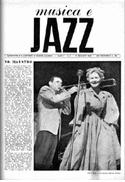
In July 1968, Cecil Taylor plays live, in solo piano, a long four-part suite called PRAXIS (thanks to sotise), which will be published in two vinyl only fourteen years later, for the initiative of Kostas Yiannoulopoulos.
Fourteen years later, in that same 1982, Pino Minafra and Roberto Ottaviano founded a quintet called the PRAXIS (the original nucleus had been created by Riccardo Di Bari drummer and militant ideology of Andria).
Then, in 1990, Pino Minafra (with Vittorino Curci and Richard Bergeron) presented at the Festival di Noci his most ambitious creation, the Italian Instabile Orchestra, probably the best fruit of Italian jazz, at international level, despite an unexplained deafness of most traditional Italian festivals.
Just a few years later, the circle is closed, when on 10 September 2000, during the 8th TALOS Festival, Cecil Taylor will play with The Orchestra created by Minafra.
That everything started from there, as in a fairy tale?
Fourteen years later, in that same 1982, Pino Minafra and Roberto Ottaviano founded a quintet called the PRAXIS (the original nucleus had been created by Riccardo Di Bari drummer and militant ideology of Andria).
Then, in 1990, Pino Minafra (with Vittorino Curci and Richard Bergeron) presented at the Festival di Noci his most ambitious creation, the Italian Instabile Orchestra, probably the best fruit of Italian jazz, at international level, despite an unexplained deafness of most traditional Italian festivals.
Just a few years later, the circle is closed, when on 10 September 2000, during the 8th TALOS Festival, Cecil Taylor will play with The Orchestra created by Minafra.
That everything started from there, as in a fairy tale?

Credits:
«cenerentola»
Label: LETICHETTA
Catalog# JLP 014
Format: LP
Country: Italy
Recorded in Bari at the Casa di Pulcinella (# A1)
and at the CM Studio (# B2)
between November and December 1982
Pino Minafra (trumpet),
Roberto Ottaviano (alto sax and soprano, clarinet),
Pippo Fumaroli (el. piano, piano), Ilario De Marinis (el. bass),
Vincenzo Mazzone (drums, percussion)
Michele Lomuto (trombone) on # 1.
Tracklisting:
Side A
1) Cenerentola - 19'28"




































.jpg)









.jpg)
































